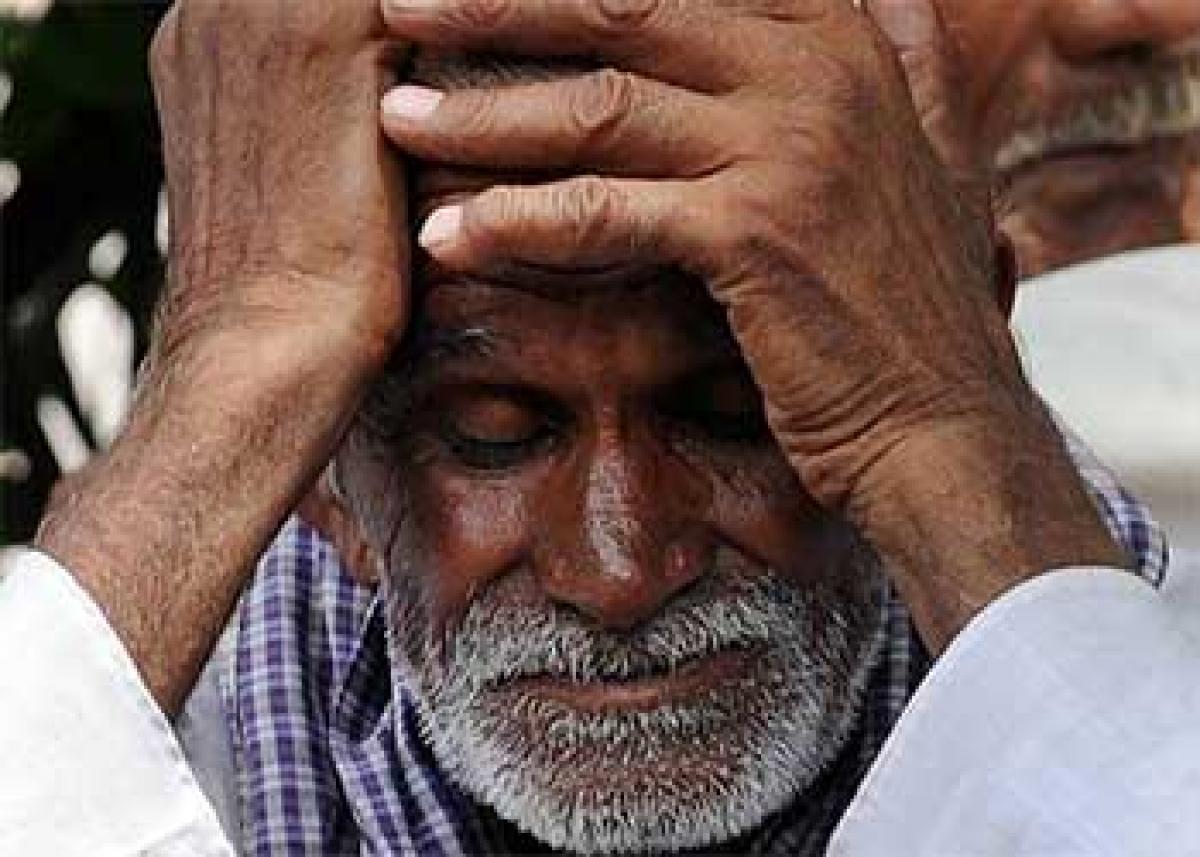Live
- Additional Collector Conducts Surprise Visit to Boys' Hostel in Wanaparthy
- Punjab hikes maximum state-agreed price for sugarcane, highest in country
- Centre okays PAN 2.0 project worth Rs 1,435 crore to transform taxpayer registration
- Punjab minister opens development projects of Rs 120 crore in Ludhiana
- Cabinet approves Atal Innovation Mission 2.0 with Rs 2,750 crore outlay
- Centre okays Rs 3,689cr investment for 2 hydro electric projects in Arunachal
- IPL 2025 Auction: 13-year-old Vaibhav Suryavanshi becomes youngest player to be signed in tournament's history
- About 62 lakh foreign tourists arrived in India in 8 months this year: Govt
- IPL 2025 Auction: Gujarat bag Sherfane Rutherford for Rs 2.60 cr; Kolkata grab Manish Pandey for Rs 75 lakh
- Assam CM meets Governor, cabinet expansion on the cards
Just In

Reports of farmers committing suicide are not just heart-rending, but they represent an extreme manifestation of agrarian distress. Myriad suggestions from a plethora of commissions are available. But, what is lacking is firm public policy to stop this spectre of suicides.
.jpg) Reports of farmers committing suicide are not just heart-rending, but they represent an extreme manifestation of agrarian distress. Myriad suggestions from a plethora of commissions are available. But, what is lacking is firm public policy to stop this spectre of suicides.
Reports of farmers committing suicide are not just heart-rending, but they represent an extreme manifestation of agrarian distress. Myriad suggestions from a plethora of commissions are available. But, what is lacking is firm public policy to stop this spectre of suicides.
Exposure to price falls induced by market volatility, nature’s fury and private profiteering coupled with official neglect have been driving the farmers into melancholy. The agricultural crisis thus induced has disproportionally impacted tenant farmers, small farmers, dry land farmers and commercial crops cultivators who constitute a significant chunk of those committing suicide.
As two-thirds of our agriculture is rain fed, the erratic monsoon due to climate change is taking a heavy toll. The average size of the Indian farm is shrinking, hampering investment and resulting in low productivity. With the expansion of population, the average size of land holding has fallen from nearly 2.3 hectares in 1970 to under 1.2 hectares now.
Politics and corruption failed the cooperative movement. Estimates by Planning Commission and World Bank reveal that the yields of several crops in India are very low by global standards, making farming unviable. For instance, the average yield of rice per hectare in India is approximately 2.2 tonnes, while the corresponding figure is 6.2 tonnes for Australia, 6 tonnes for United States, 4.6 tonnes for China, and even for Brazil it is 3.2 tonnes.
Greedy traders in collusion with corrupt officials squeeze farmers in the markets. Administration fails to act firmly even though market yards see intermittent peasant protests. Competitive populism wants our farmers to satisfy with subsidies rather than live with dignity by providing them income security through concrete policy action.
Jayati Ghosh Commission on farmers suicides appointed by the united Andhra Pradesh government – whose recommendations still hold relevant – said that apart from structural factors, agrarian crisis is abetted due to collapse of public institutions that affect farmers and farming. The solutions to the current crisis require several interventions.
They include correcting spatial inequities in access to irrigation and promoting sustainable water management, bringing all cultivators including tenant farmers into the ambit of institutional credit, focusing on dry land farming through technology extension, price and other inputs, encouraging cheaper and more sustainable input use with greater public provision, regulation of quality and price and strong research and extension support.
Farmers need to be protected from high amplitude of fluctuation in prices by setting up price stabilisation fund with reasonable allocations to it. Rural economy has to be diversified with more value-added activities and non-agricultural employment. Agriculture alone cannot sustain livelihoods and incomes. Such a strategy would ensure income security when crops fail.
Other measures can include expansion of crop insurance, effective disaster management to reasonably insulate farmers from natural calamities, substantial increase in public investment in agriculture and allied sectors. Government policies should comprehensively address the agrarian crisis. Any denial by the people in power or a mere political rhetoric by the opposition would only end up in political harvest with farmers being pushed to the wall– anything else can wait but not agriculture.

© 2024 Hyderabad Media House Limited/The Hans India. All rights reserved. Powered by hocalwire.com







